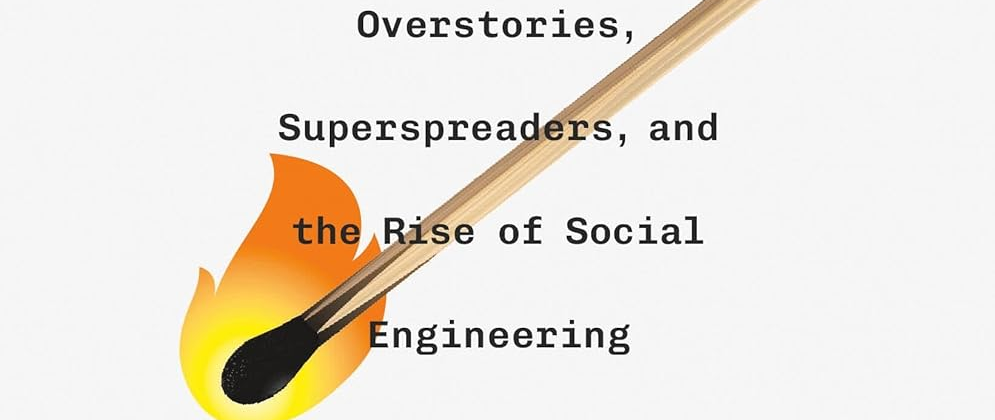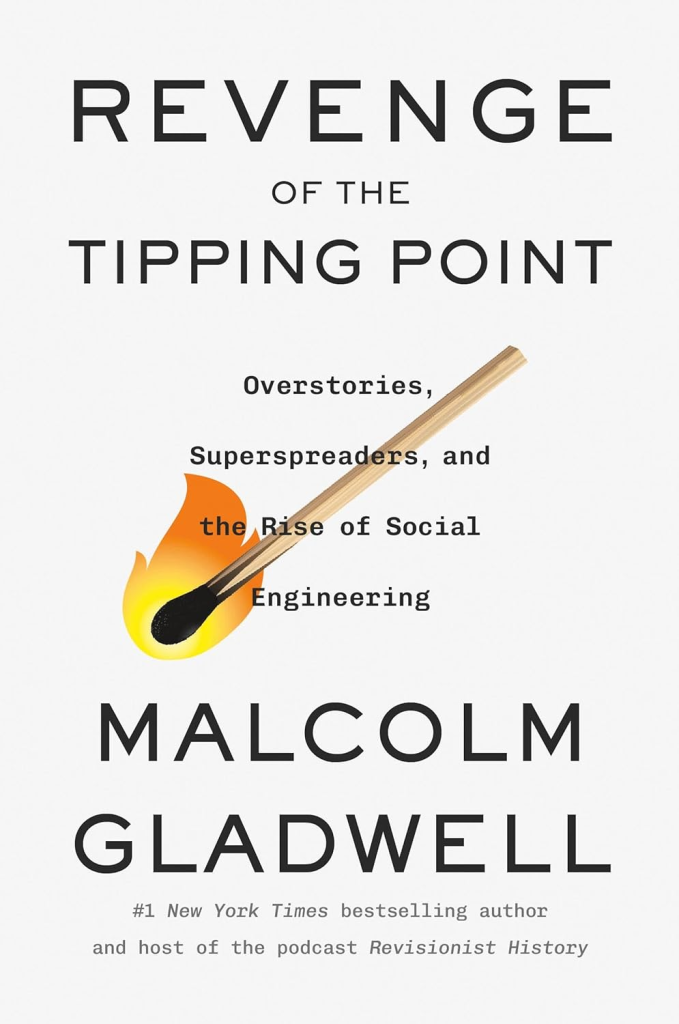

There are few non-fiction authors today more popular and well-known than Malcolm Gladwell. Even people who don’t read much know his name. People who read have probably read at least one of his books. Or they’ve read one of his essays in a magazine or listened to his podcast, Revisionist History. And most people love Malcolm Gladwell. That’s why he could write Revenge of the Tipping Point (2024)—a book whose title references his own successful, earlier book, The Tipping Point (2000). But in certain circles, few authors are as disliked as Malcolm Gladwell.
What’s to love about Malcolm Gladwell? Many things. He is a good writer. He has clean prose and is very engaging. He does good interviews. He excels at taking scientific studies and theories and simplifying them for a general audience. He was among the first in the wave of people and podcasts who, more or less, make a living that way. He is a consistent producer, churning out a new book every couple of years. He has a broad audience: he can write for the New Yorker and your aunt who would never read it. Gladwell is also always courteous and kind and self-deprecating. He loves running and is an advocate for track and field.
What’s not to love about Malcolm Gladwell? It must be said that some of the criticism of Gladwell seems to be envy. When Jack Johnson first hit it big as a musician, I recall many teenage and twenty-something boys complaining that they were “just as good.” Some of the writers who dislike Gladwell seem to be coming from a similar place. Sometimes people are also just sick of anyone they keep hearing about all the time. There are other authors.
There are also valid criticisms of Gladwell’s approach, some of which can be explained with his newest book, The Revenge of the Tipping Point. Gladwell’s whole game is taking things that are complicated and making them clearer. That is the job. He excels at it. But sometimes he uncomplicates things a bit too much. For example, when writing about sports and the Ivy League, he is on track in so many ways. There’s no denying that Ivy League schools cooked up all kinds of schemes to reduce and avoid Jewish students. Sports and the “well-rounded student” have long been part of that. And sports do continue to let in a certain kind of student who otherwise might not make it (think country club, not DEI—this is about squash and rowing and field hockey, etc.). Sports helps balance the equation in a certain way. But when Gladwell describes the situation, he often implies that the point of sports is only getting more privileged students and avoiding other kinds, and that it is “obvious” or something like that—he often boils things down to just one explanation. In this case, even if some of the originators of the scheme had the intentions he describes, he fails to consider that some of the perpetuators may have other objectives. It’s very possible for people to believe that the “sporting spirit” makes a better candidate—British culture ran on that conceit for about a hundred years.
The job is to simplify, the risk is over-simplifying. In another passage, Gladwell writes about how people didn’t see what was coming at the end of the Soviet Union. He says that Havel was wrong about Gorbachev—didn’t see him as a hopeful figure for ending communism. The thing is, Havel wasn’t wrong about Gorbachev. Gorbachev’s intent was not to end the Soviet Union or get away from communism or set Czechoslovakia free. Gorbachev was a true believer. Havel and Gorbachev were both surprised by what kind of career Gorbachev would have and what the effects of his policies would be. In retrospect, we can see how Gorbachev’s decisions meant the quick decline of the Soviet Union, but those policies were intended to preserve and perpetuate that union. This is the kind of oversimplifying that drives some readers crazy.
In many cases, Gladwell could minimize the over-generalization by bringing back a little complication. Something as simple as adding a phrase like “one possible explanation is,” would solve the problems that a phrase like “the reason is obvious” creates. Gladwell can be especially triggering for historians, whose whole approach to the past insists on contingency and believes in multiple causes, whereas he often likes to isolate a single cause and occasionally to make an outcome seem inevitable.
If it was baseball, Malcolm Gladwell would be a really reliable hitter. He has a great on-base percentage. Some of the pitches he swings at would make you crazy, but he’s hardly alone in sometimes striking out. Gladwell can be a good sport about this. When David Epstein, author of Range, took him on to explain why the 10,000 hours rule really isn’t a reliable rule, Gladwell engaged and admitted defeat. Of course, everyone you know still believes in the 10,000 hours rule. That’s the thing about success. It makes things stick, even when they shouldn’t.
“It’s complicated.” We like to say it, but we don’t like to hear it. We want simple explanations. We want things “boiled down.” And then once we hear an explanation, we hang onto it. We don’t want to reconsider it. Malcolm Gladwell plays into these tendencies, probably as unintentionally as Gorbachev went about dismantling the Soviet Union. But the tendencies aren’t his fault or even his problem. They are, like many things we would rather not be, on us. Should you read the new Malcolm Gladwell? Go ahead, it’s very interesting. You will probably enjoy it. His engagement with metanarratives is especially intriguing. Just remember that some of the subject matter is a little more complicated than it seems.
This is measured, insightful, and apt analysis. Many thanks.
After learning that the 10,000 hours to excellence was bogus, I try to be more cautious when I read his delightful prose. It’s hard to do.